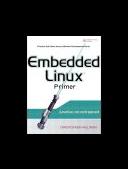Книга: Embedded Linux Primer: A Practical, Real-World Approach
14.5.2. Dumping the printk Log Buffer
14.5.2. Dumping the printk Log Buffer
When we discussed printk debugging in Section 14.3.6, we pointed out some of the limitations of this method. printk itself is a very robust implementation. One of its shortcomings is that you can't see any printk messages until later in the boot sequence when the console device has been initialized. Very often, when your board hangs on boot, quite a few messages are stuck in the printk buffer. If you know where to find them, you can often pinpoint the exact problem that is causing the boot to hang. Indeed, many times you will discover that the kernel has encountered an error that led to a call to panic(). The output from panic() has likely been dumped into the printk buffer, and you can often pinpoint the exact line of offending code.
This is best accomplished with a JTAG debugger, but it is still possible to use a bootloader and its memory dump capability to display the contents of the printk buffer after a reset. Some corruption of memory contents might occur as a result of the reset, but log buffer text is usually very readable.
The actual buffer where printk stores its message text is declared in the printk source file .../kernel/printk.c.
static char __log_buf[__LOG_BUF_LEN];
We can easily determine the linked location of this buffer from the Linux kernel map file System.map.
$ grep __log_buf System.map
c022e5a4 b __log_buf
Now if the system happens to hang upon booting, right after displaying the "Uncompressing Kernel Image . . . OK" message, reboot and use the bootloader to examine the buffer. Because the relationship between kernel virtual memory and physical memory is fixed and constant on a given architecture, we can do a simple conversion. The address of __log_buf shown earlier is a kernel virtual address; we must convert it to a physical address. On this particular PowerPC architecture, that conversion is a simple subtraction of the constant KERNELBASE address, 0xc0000000. This is where we probe in memory to read the contents, if any, of the printk log buffer.
Listing 14-23 is an example of the listing as displayed by the U-Boot memory dump command.
Listing 14-23. Dump of Raw printk Log Buffer
=> md 22e5a4
0022e5a4: 3c353e4c 696e7578 20766572 73696f6e <5>Linux version
0022e5b4: 20322e36 2e313320 28636872 6973406a 2.6.13 (chris@
0022e5c4: 756e696f 72292028 67636320 76657273 junior) (gcc
0022e5d4: 696f6e20 332e342e 3320284d 6f6e7461 version 3.4.3 (Monta
0022e5e4: 56697374 6120332e 342e332d 32352e30 Vista 3.4.3-25.0
0022e5f4: 2e37302e 30353031 39363120 32303035 .70.0501961 2005
0022e604: 2d31322d 31382929 20233131 20547565 -12-18)) #11 Tue
0022e614: 20466562 20313420 32313a30 353a3036 Feb 14 21:05:06
0022e624: 20455354 20323030 360a3c34 3e414d43 EST 2006.<4>AMC
0022e634: 4320506f 77657250 43203434 30455020 C PowerPC 440EP
0022e644: 596f7365 6d697465 20506c61 74666f72 Yosemite Platform.
0022e654: 6d0a3c37 3e4f6e20 6e6f6465 20302074 <7>On node 0
0022e664: 6f74616c 70616765 733a2036 35353336 totalpages: 65536
0022e674: 0a3c373e 2020444d 41207a6f 6e653a20 .<7> DMA zone:
0022e684: 36353533 36207061 6765732c 204c4946 65536 pages, LIF
0022e694: 4f206261 7463683a 33310a3c 373e2020 O batch:31.<7>
=>
0022e6a4: 4e6f726d 616c207a 6f6e653a 20302070 Normal zone: 0
0022e6b4: 61676573 2c204c49 464f2062 61746368 pages, LIFO batch
0022e6c4: 3a310a3c 373e2020 48696768 4d656d20 :1.<7> HighMemzone:
0022e6d4: 7a6f6e65 3a203020 70616765 732c204c 0 pages,
0022e6e4: 49464f20 62617463 683a310a 3c343e42 LIFO batch:1.<4>
0022e6f4: 75696c74 2031207a 6f6e656c 69737473 Built 1 zonelists
0022e704: 0a3c353e 4b65726e 656c2063 6f6d6d61 .<5>Kernel command
0022e714: 6e64206c 696e653a 20636f6e 736f6c65 line: console
0022e724: 3d747479 53302c31 31353230 3020726f =ttyS0,115200
0022e734: 6f743d2f 6465762f 6e667320 72772069 root=/dev/nfs rw
0022e744: 703d6468 63700a3c 343e5049 44206861 ip=dhcp.<4>PID
0022e754: 73682074 61626c65 20656e74 72696573 hash table entries
0022e764: 3a203230 34382028 6f726465 723a2031 : 2048 (order:
0022e774: 312c2033 32373638 20627974 6573290a 11, 32768 bytes).
0022e784: 00000000 00000000 00000000 00000000 ................
0022e794: 00000000 00000000 00000000 00000000 ................
=>
It's not very pretty to read, but the data is there. We can see in this particular example that the kernel crashed someplace after initializing the PID hash table entries. With some additional use of printk messages, we can begin to close in on the actual source of the crash.
As shown in this example, this is a technique that can be used with no additional tools. You can see the importance of some kind of early serial port output during boot if you are working on a new board port.
- Page buffers
- 4.4.4 The Dispatcher
- TCP REMOTE BUFFER
- About the author
- Chapter 7. The state machine
- Appendix E. Other resources and links
- Example NAT machine in theory
- The final stage of our NAT machine
- Smss, Csrss и Winlogon
- Compiling the user-land applications
- The conntrack entries
- Untracked connections and the raw table




